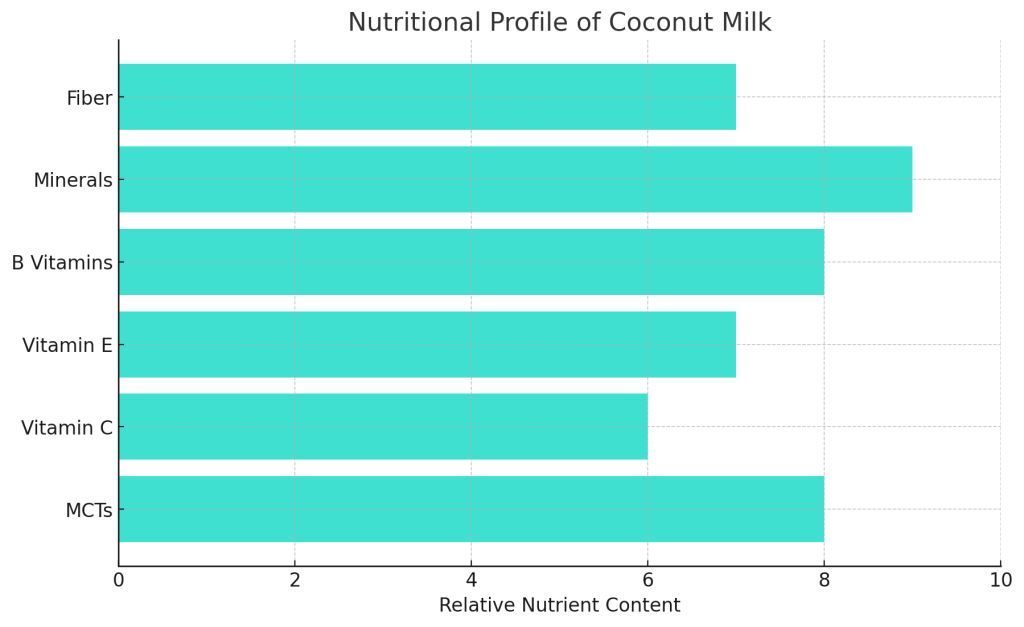Key Takeaways:
|
Understanding the Solidification of Canned Coconut Milk
Canned coconut milk’s tendency to solidify can puzzle many consumers. Here, we unravel the mystery behind this common phenomenon and offer insights into its implications for quality and usage.
Why Does Canned Coconut Milk Solidify?
Canned coconut milk often solidifies when stored at room temperature, in a cold pantry, or in the fridge. This happens because coconut oil, a primary component of coconut milk, solidifies at lower temperatures, resulting in a distinct separation into two layers: a solid white cream at the top and liquid water at the bottom. The process is akin to the natural separation of cream from milk in dairy products, a sign of minimal processing and high coconut content.
Is Solid Coconut Milk a Sign of Quality?
Interestingly, the solidification of coconut milk is an indicator of quality. It suggests a higher coconut content and minimal processing. When coconut milk solidifies, it separates into a rich cream and a thinner, milkier texture beneath, which can easily be scooped out with a spoon. This quality is valued by culinary enthusiasts who seek authentic, unadulterated ingredients for their cooking.
Is It Safe to Consume Solidified Coconut Milk?
Concerns about the safety of solid coconut milk are common. Rest assured, the solidification of coconut milk is a natural and safe occurrence. The creamy and waxy layer that forms on top of the can is perfectly safe to consume and retains all the flavor and nutritional value of liquid coconut milk.
How Additives Influence Solidification
The composition of canned coconut milk can vary between brands. Some brands add stabilizers like guar gum, which can prevent the milk from solidifying. Other brands might include starches or carbohydrate additives like corn starch or methyl cellulose, impacting the texture and consistency of the coconut milk.
Incorporating Solid Coconut Milk in Recipes
Given its versatility, solid coconut milk can be a boon in the kitchen. From enriching curries to adding creaminess to desserts, solid coconut milk offers a texture and flavor that is highly sought after in various cuisines. Its creamy layer, when whisked or blended, can be incorporated seamlessly into dishes, lending a rich, tropical flavor.
For further information on the storage, shelf life, and culinary uses of canned coconut milk, consider exploring our detailed guides:
- How Long Does Canned Coconut Milk Last?
- How to Tell if Canned Coconut Milk is Bad
- How to Store Canned Coconut Milk After Opening
- How to Make Canned Coconut Pecan Frosting Better
- The Difference Between Canned Coconut Milk and Coconut Milk in a Carton

This visualization provides a quick glance at how coconut milk is not only a flavorful addition to a variety of dishes but also a nutritious one, offering a range of health benefits from energy boost to improved heart health.
Creative Culinary Uses for Solid Coconut Milk
Solid coconut milk is not just a kitchen curiosity but a versatile ingredient in its own right. Let’s explore how this rich, creamy substance can be a game-changer in your culinary creations.
Transforming Desserts
Solid coconut milk can be whipped into a luscious cream, perfect for topping desserts like pies or fruit salads. Its rich texture and tropical flavor make it an excellent dairy-free alternative to traditional whipped creams.
Enhancing Savory Dishes
In savory dishes, the solid part of coconut milk adds depth and creaminess. It’s particularly effective in curries, soups, and sauces, where it imparts a silky texture and a subtle coconut flavor. This can be especially useful in vegan or lactose-free cooking, where it serves as a robust substitute for creams or yogurts.
Coconut Milk in Baking
Bakers can rejoice at the prospect of using solid coconut milk in their recipes. Whether it’s in cakes, cookies, or bread, this ingredient adds moisture and a delicate coconut aroma. It’s especially useful in vegan baking, acting as a binding and enriching agent.
DIY Coconut Butter
Did you know that you can make coconut butter from solid coconut milk? Simply blend the solid portion until it reaches a butter-like consistency. This can be used as a spread or added to smoothies and oatmeal for a nutritious boost.
Storing and Handling Solid Coconut Milk
Proper storage and handling of solid coconut milk are crucial to maintain its quality and extend its shelf life. Here are some tips:
- Refrigeration: Keep opened coconut milk in the refrigerator. This not only preserves it but also maintains the solid consistency, which is easier to scoop and measure.
- Shaking the Can: If you prefer a more liquid consistency, shake the can vigorously before opening. This helps to mix the solid and liquid layers.
- Freezing: For longer storage, you can freeze coconut milk. Freezing will change the texture, but it remains usable for cooking.
- Discover the Delight of Homemade Coconut Cream Pie: A Step-by-Step Guide
- Enjoying Your Coconut Cream Pie: A Guide to Storage and Shelf Life
- Refined vs. Unrefined Coconut Oil: Understanding the Key Differences
Nutritional Benefits of Coconut Milk
Understanding the nutritional profile of coconut milk is essential for health-conscious consumers and culinary enthusiasts alike. Here’s a breakdown of the key nutrients found in solid coconut milk and their benefits.
Rich in Medium-Chain Triglycerides (MCTs)
Coconut milk is a great source of medium-chain triglycerides (MCTs), which are fats that the body can easily absorb and convert into energy. This makes it an excellent ingredient for people looking for a quick energy boost or managing their weight.
Contains Essential Vitamins and Minerals
Solid coconut milk is packed with essential vitamins and minerals, including vitamins C, E, B1, B3, B5, and B6, as well as minerals like iron, selenium, sodium, calcium, magnesium, and phosphorous. These nutrients contribute to overall health, supporting the immune system, bone health, and more.
High in Fiber
The solid part of coconut milk is high in dietary fiber, which aids in digestion and promotes a feeling of fullness. This can be particularly beneficial for those looking to manage their appetite and support digestive health.
Heart Health
While coconut milk is high in saturated fat, it’s important to note that these fats are different from those found in animal products. The lauric acid in coconut milk can improve cholesterol levels and heart health when consumed in moderation.
Combining Health and Flavor
Coconut milk’s solid form not only brings a unique texture and flavor to dishes but also integrates health benefits seamlessly into your diet. Whether it’s in a morning smoothie, a hearty curry, or a decadent dessert, incorporating solid coconut milk can enrich your meals both nutritionally and taste-wise.
CoconutSphere.com is dedicated to offering you a wealth of information on coconut-based products, their nutritional benefits, and diverse culinary applications. Explore our extensive collection of articles to discover new and exciting ways to include coconut products in your diet for a healthier, more flavorful lifestyle.

